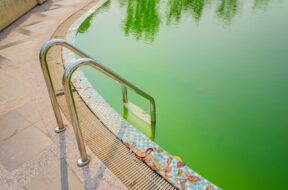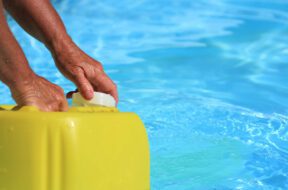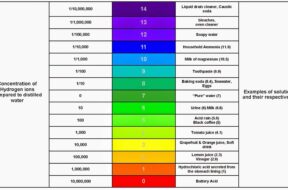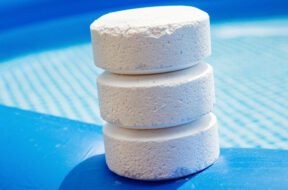
Want to learn more about algaecide? Read on to find out when to add algaecide to your pool maintenance routine and other helpful tips.
Finding the best pool algaecide or the best pool shock to treat your water, or the best pool vacuum to get out the debris is essential to maintaining your swimming pool. But it’s only a start. To ensure that your pool water is chemically balanced and safe for swimming, you need to use a pool testing kit regularly! Even if your pool looks clean and clear, the water chemistry might be off. It could damage your pool equipment, and may also be unsafe for swimmers.
That’s why a reliable pool water test kit is every pool owner’s best friend. It can reveal your pool’s levels of free chlorine, pH, total alkalinity, calcium hardness, cyanuric acid, and more. If you have a salt water pool, you’ll need to test your salt level, too.
Trying to choose the best pool test kit brand for pool maintenance? This guide will help you determine the best pool test kit based on your unique needs and budget.
A majority of swimming pool water test kits on the market check for chlorine, pH, and alkalinity. You can also find water test kits that test for cyanuric acid and calcium hardness, as well as some that assess bromine levels, borate, and other chemicals. We recommend testing for all of these to ensure that everything is balanced and safe. For this reason, the best pool test kit will check for at least five chemical ranges.
There are various types of test kits you can get for your pool, including liquid dropper kits, pool test strips, and digital testers. Some are known for being more accurate than others, and some are more budget-friendly, while others are specifically designed to test salt water pools. Here are the best swimming pool test kits in each category.
If you’re looking for a highly rated, reliable test kit that’s suitable for all types of pools and hot tubs, check out the K-2005 Complete Test Kit from Taylor Technologies. This pro-level pool kit is ideal for routine testing – but unlike other professional-grade kits, it’s easy to use.
The K-2005 kit tests for total chlorine, free chlorine, bromine, pH, total alkalinity, acid demand, base demand, and calcium hardness, as well as cyanuric acid. A cyanuric acid test is vital for outdoor pools, as the chemical stabilizes chlorine in sunlight. Like other pool test kits from the 2000 Series, it comes with reagent bottles and printed color-matching charts. This allows you to easily compare each color and get an accurate read.
When it comes to pool water testing, accuracy is essential. If you can’t get accurate readings of your water chemistry, balancing it effectively will be almost impossible. So what’s the most accurate pool test kit? At Pool Calculator, we’re partial to test strips, and we’ll go over our top picks below. But for a complete kit that stands out in terms of accuracy, we recommend the Poolmaster 5-Way Test Kit or the Taylor Technologies K-2006 Pool Test Kit.
The 5-Way Test Kit from Poolmaster is a top-rated product that’s both affordable and accurate. It tests for chlorine, pH, alkalinity, acid demand, and bromine level. In regards to the accuracy, this might be the best home pool test kit for maintaining balanced water chemistry. It includes five liquid dropper solutions – including phenol red – and a transparent test block with color chips for comparing and matching chemical levels from your water sample. This kit comes in a convenient polyethylene case, which is nice for organizing and storing the droppers and test block.
The K-2006 Pool Test Kit from Taylor Technologies is similar to the K-2005 kit, except for the method it uses to test total chlorine, combined chlorine, and free chlorine. The K-2005 water testing kit uses a color-matching technique, whereas the K-2006 kit uses a drop test, which tends to be more accurate. In addition to chlorine, it tests your pH level, total alkalinity, acid demand, base demand, calcium hardness, and cyanuric acid.
If you own a salt water pool, you know you still need to use chlorine to keep the water clean and balanced. While virtually all test kits can be used in salt water pools, they don’t all test the salinity (salt level). So what’s the best saltwater pool test kit? We suggest the K-1766 Saltwater Kit from Taylor Technologies or the Saltwater Swimming Pool Test Strips from AquaChek.
The Taylor Technologies K-1766 Sodium Chloride Salt Water Test Kit is a top choice among saltwater swimming pool owners. It’s designed to be used with saltwater chlorine generators and utilizes an argentometric testing method, meaning it involves silver ions. This pool water test kit is also notably easy to use and stands out for its accuracy. It comes in a waterproof case and includes a graduated test tube, a chromate indicator, and a silver nitrate reagent.
Many saltwater chlorinators will tell you when your salinity and chlorine levels are too low or too high, in which case you can use this test to see exactly where you stand. Of course, we recommend regularly testing your pool water, even if your saltwater chlorine generator doesn’t indicate that your levels are off.
Another excellent option for testing pool salinity is AquaChek Saltwater Swimming Pool Test Strips. This reliable product is more affordable than the K-1766 kit from Taylor Technologies. One bottle comes with ten test strips, which test for sodium chloride (salt) in pools with saltwater chlorinators.
Within minutes, you can get an accurate read of your pool’s salt levels. This will tell you whether you need to boost your chlorine total to balance the water. We like these test strips because they’re straightforward and easy to use, which is ideal for frequent testing.
Digital water testers are very convenient because they don’t require any color matching. That said, they’re substantially more expensive than other types of kits, so you’ll want to make sure you’re getting one you can count on. The best digital pool test kit currently on the market is the LaMotte ColorQ Pro 7.
This kit comes in a water-resistant case and includes seven liquid reagents and a photometer that provides an accurate digital reading of your chemical ranges. This pool water tester checks for free and total chlorine, cyanuric acid, total hardness, bromine, pH, and alkalinity.
Pool test strips are super easy to use and affordable compared to other kits. And as we mentioned, pool test strips are one of the most dependable options in terms of accuracy. All pool owners can benefit from keeping some on hand. So which brand of pool test strips is the best? Our picks include Poolmaster Smart Test Strips, AquaChek Test Strips, and JNW Direct Pool and Spa Test Strips. Here’s why.
When you dip Poolmaster Smart Test 4-Way Combo Test Strips into your pool water, you’ll get an instant reading of four crucial chemical ranges, including pH, alkalinity, chlorine, and bromine. One container comes with 50 dip-and-read strips, which won’t bleed colors when they come into contact with water.
AquaChek 7-Way Pool & Spa Test Strips provide a precise chemical reading within 15 seconds of being dipped into pool or spa water. They test for free chlorine, total chlorine, cyanuric acid, bromine, total hardness, pH, and total alkalinity. Each container has a color chart on the side and comes with 100 strips.
The top-rated Pool and Spa Test Strips from JNW Direct are exceptionally easy to use and offer instant, accurate results. Each bottle comes with 100 test strips and has a convenient color comparator chart on the side. With every test strip, you can check your free and total chlorine, calcium hardness, pH level, and total alkalinity.
Of course, testing your pool water is only the beginning. The other essential aspect of maintaining your pool is balancing the water so it stays clean and healthy. An unbalanced pool can be hazardous for swimmers and disastrous for your pump, liner, filter, and other pool equipment.
As we mentioned above, there are many different pool chemical levels to watch – and all of them are important. Chlorine and bromine sanitize pool water by eliminating bacteria, algae, and other contaminants. And yet, too much of these chemicals can be hard on your eyes, skin, and hair. When total alkalinity and pH are off, it can lead to corrosion and pool scale. Also, too much calcium (calcium hardness) can clog your pipes and filtration system.
If balancing your pool water chemistry is beginning to sound impossible, don’t fret! Pool Calculator makes the whole process a breeze. With our simple app, you can enter your ranges and find out exactly how much of each chemical you need to add to balance your pool water. To get started, check out our desktop app or get Pool Calculator for your Android or iOS mobile device.
https://www.sciencedirect.com/topics/chemistry/phenol-red
https://www.apsp.org/Portals/0/RWQ%20Fact%20Sheets/Cyanuric%20Acid%20-%20July%2029,%202014.pdf
https://www.thespruce.com/how-to-use-a-pool-test-kit-2736561
https://www.rsc.org/publishing/journals/prospect/ontology.asp?id=CMO:0002145&MSID=B000901F

Want to learn more about algaecide? Read on to find out when to add algaecide to your pool maintenance routine and other helpful tips.

In this quick guide, we’ll answer the question “can you over shock a pool” and unveil the factors to consider when shocking a pool.

Maintaining both pH and total alkalinity in your swimming pool is important for keeping your pool properly sanitized and non-corrosive. Total alkalinity is to pH what cyanuric acid is to free chlorine. Total alkalinity stabilizes pH levels. The ideal pool pH level is 7.4 to 7.6. The ideal total alkalinity level is 80 to 120 ppm.

The Association of Pool and Spa Professionals recommends free chlorine levels for both swimming pools and hot tubs be kept between 2.0 and 4.0 ppm. However, the Center for Disease Control recommends free chlorine stay above 1 ppm in pools and 3 ppm in hot tubs.